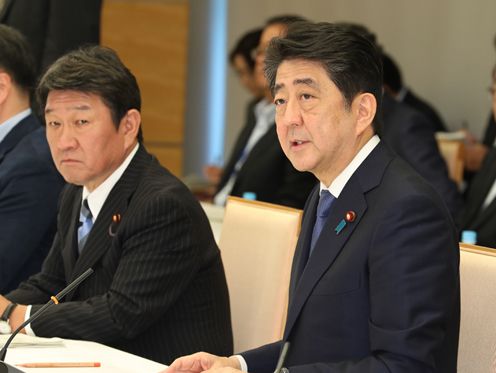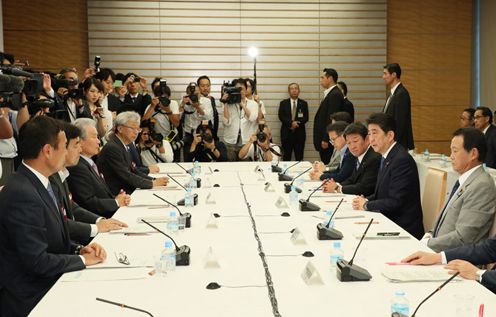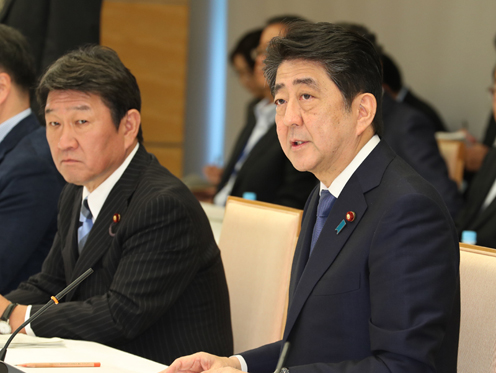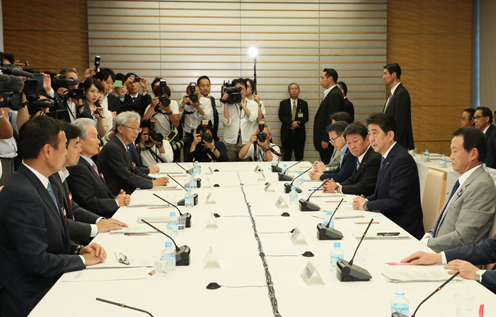Home > News > The Prime Minister in Action > September 2017 > Meeting of the Council on Economic and Fiscal Policy
The Prime Minister in Action
Meeting of the Council on Economic and Fiscal Policy
September 25, 2017

Photograph of the Prime Minister making a statement (1)

Photograph of the Prime Minister making a statement (2)
[Provisional Translation]
On September 25, 2017, Prime Minister Shinzo Abe held the 13th meeting in 2017 of the Council on Economic and Fiscal Policy at the Prime Minister's Office.
At the meeting, there was a discussion on expectations to the Abe Cabinet such as human resources development and the productivity revolution.
Based on the discussion, the Prime Minister said,
“Today we discussed initiatives that the new Cabinet should undertake, in particular, the revolutions on human resources development and productivity. I would like to proceed with these initiatives as follows.
A major pillar of the economic policies of this Cabinet is the revolution on developing human resources, and this is the focus of the efforts of the Abe Cabinet to create a society in which all citizens are dynamically engaged. Another pillar is the productivity revolution. In order to promote robust wage increases and investment, we have positioned the three years leading up until FY2020 as an intensive investment period. The Cabinet will work as one to formulate a new policy package by the end of this year so as to specify the initiatives that these two pillars will entail.
In regard to the revolution on developing human resources, we will firstly make tuition fees at universities and other higher education institutions free for children from low-income households, who are truly in need of support. To that end, we will significantly increase fund-type scholarships to cover the necessary daily life expenses, and tuition waiver measures, so that economically disadvantaged young people can concentrate on their studies. Secondly, we will make a concerted effort to accelerate the provision of early childhood education for free. In other words, as well as making all kindergarten and childcare centers free of charge for all children between three and five years of age, we will also make them free of charge for all children in low-income households aged from birth to two years old. Thirdly, we will bring forward the schedule for the Plan for Raising Children with Peace of Mind, which aims to achieve zero children on waiting lists for childcare facilities, and further expand the capacity of childcare facilities by 320,000 children by the end of FY2020. Fourthly, to secure the caregiving personnel needed to reduce the number of people who leave employment to provide nursing care to zero, we will further improve employment conditions so as to eliminate the gap in wages with other industries. Fifthly, we will promote ‘recurrent education (continuing education),’ enabling people to continue to learn, whatever their age. Sixthly, we will advance reform of universities and other higher education institutions, in order to meet the demand for practical education, such as addressing the diverse needs of working professionals and providing the education required as IT personnel. Through these measures, I intend to implement bold policies that amount to two trillion yen.
Without funding, however, these measures will be nothing more than a fantasy. We will not be able to realize them. Meanwhile, along with securing stable financial resources, we must also steadily advance fiscal soundness. Maintaining the right balance will be an important challenge. In regard to funding for human resources development, we will produce a thoroughgoing conclusion. In doing so, we will sufficiently utilize funding from the consumption tax rise planned for October 2019. At the same time, we will definitely realize fiscal consolidation. We will also consider systemic reforms, such as insurance formulae, giving due consideration to discussions by the ruling parties.
As for the productivity revolution, in order to promote investment for improving the productivity of small- and medium-sized enterprises, and to channel the record-breaking profits achieved by large and medium-sized enterprises to wages and capital investment, we will consider developing conditions that encourage wage increases and investment, through budgetary, taxation and systemic reforms.
I would like Minister Motegi to compile the policy package, and to work in consultation with Minister Aso while doing so. I also request Ministers Hayashi, Kato, and Seko, and the other relevant Cabinet members to extend their full cooperation. Thank you.”


